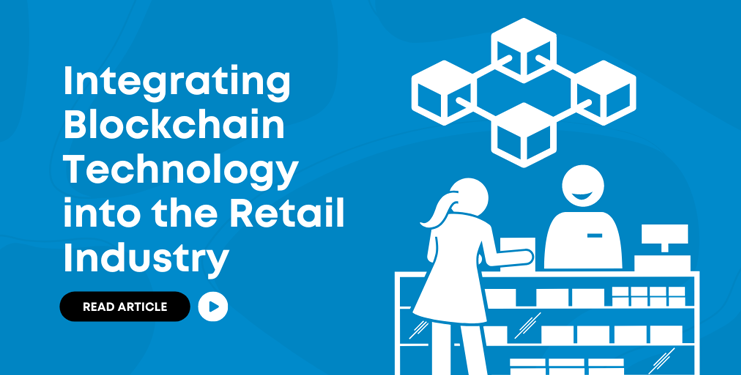Like it or not, the world is changing at the speed of light. Technology has evolved in such a way that there is no industry where you would not find some of its features. And among all the updates coming each day, crypto and blockchain may be the two topics bringing the most considerable amount of news to the table.
Since 2009, when the first cryptocurrency was launched, developers have been working on finding new ways of introducing crypto and blockchain in other industries, too. And it may be fair to say that they did it successfully in many situations.
Remember when Laszlo Hanyecz ordered two large pizzas and paid 10,000 BTC? This was the first crypto payment completed ever. And it may be one of the first situations when crypto made its way into the retail industry.
Thus, are there other ways to integrate crypto, especially blockchain technology, into the retail industry? And what are the advantages and downsides of doing that? Stick with us to find out.
Understanding Blockchain Technology
Blockchain technology is an advanced mechanism allowing information sharing transparently and securely. The information is stored in blocks that are linked together, thus forming a blockchain.
One of the most exciting and valuable facts about blockchain is that the stored data cannot be deleted or modified after being verified and added to a block.
Therefore, blockchain technology provides a high level of security. Furthermore, blockchains protect users’ privacy, too. Basically, although the transactions can be seen by everyone looking the blockchain up, it’s very difficult to find out who the parties involved in the transaction are and why they did that transaction.
Thanks to its features, blockchain technology has also started to make its way into the retail industry. In fact, a Deloitte study tells us that nearly 75% of retailers plan to accept cryptocurrency payments in the next 2 years.
Because it can be used to develop an unalterable or immutable ledger, retailers can use it to track payments, orders, and deliveries, as well as the origins of the products, if their company does not manufacture them. And even though 50% of retailers plan to use a third party in order to exchange crypto for fiat, this still does mean that consumers will be able to pay with crypto for retail products and services from sub-sectors such as cosmetics, transportation, food, and beverage, or electronics.
This way, blockchain technology is a remarkably better option for retail companies, helping them improve their processes and increasing productivity and efficiency.
Using Blockchain Technology in the Retail Industry – Main Benefits and Downsides
It is not news that blockchain technology is revolutionizing more and more industries worldwide. And when it comes to the retail industry, there are many benefits to using blockchain technology.
One of the most important features retailers include in their businesses may be crypto payments. Thanks to the primary benefits blockchain technology bring, retail companies can use it to increase the effectiveness of their transactions.
For instance, many companies opt to use blockchain technology to receive crypto payments from their customers. This process does not necessarily require using any third party, making it faster and more cost-effective. However, companies can choose to exchange the crypto they receive for fiat through third parties, making it even easier to accept crypto payments, as they will not be affected by the crypto market’s high volatility.
However, this practice has a downside, and it makes companies think twice before introducing blockchain technology in their payment strategy.
Crypto gas fees have always been a deal breaker for some businesses, and it is no wonder why. The fees can change based on some factors (e.g., supply and demand), and even if sometimes they may not affect the retailers that much, they can fluctuate suddenly.
And since blockchain technology is improving continuously, there is a question that many users may have: is there any possibility of reducing or removing the gas fees associated with crypto transactions in the retail industry?
Well, the answer may surprise and gladden those aiming to work with crypto transactions.
How to Solve the Gas Issue?
Some blockchains require gas fees. However, others work based on gasless technologies.
The project leading the way in this field is Redlight Finance. They aim to solve the Blockchain Trilema (Scalability, Decentralization, and Security) through an utterly gas-free solution by employing a layer 1 EVM (Ethereum Virtual Machine) compatible blockchain. Furthermore, another goal is to help other industries embrace blockchain technology and use it to develop more effective processes within their activities.
This way, the retail market will also get better access to the blockchain game. And this comes with benefits for both the retail and crypto industries. Once retail companies decide to use blockchain technology, the crypto industry will also grow.
Final Thoughts
With the blockchain industry constantly evolving, many other industries are considering introducing blockchain technologies in their activity, one of which is the retail industry.
Retailers seem to have learned some of the benefits of blockchain technology, and while 75% of retailers plan to start accepting crypto payments in the next 2 years, others are going even further with their strategies and trying to follow deliveries through blockchain features.
Because many crypto transactions require gas fees, which can be a major downside for both customers and retail companies, some crypto projects aim to reduce or remove gas fees to make other industries embrace blockchain technology faster.
DisClamier: This content is informational and should not be considered financial advice. The views expressed in this article may include the author's personal opinions and do not reflect The Crypto Basic opinion. Readers are encouraged to do thorough research before making any investment decisions. The Crypto Basic is not responsible for any financial losses.


